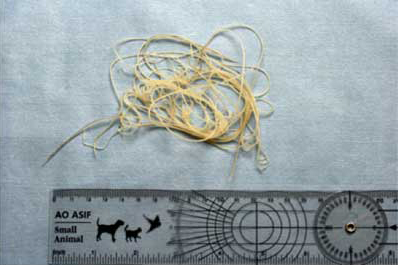As a practicing veterinarian in the Mississippi River Delta region, I have seen hundreds of cases of heartworms.
Heartworm larva passes to dogs (and cats!) from a mosquito bite and many people do not realize that ONE mosquito can transmit heartworm disease.
However, if you are protecting your pet with a heartworm preventative - all 12 months of the year - then heartworm disease doesn't have to be a concern!
How Heartworms Can Affect Your Pet
When a pet that is not on heartworm prevention is bitten by a mosquito, heartworm larvae may be passed into the pet's bloodstream.
In this environment the larvae will grow into adult worms over time, eventually obstructing blood flow through the heart.
The larvae travel the body, but end up in the right chamber of the heart and the lungs where there is less pressure from blood flow.
As you can see from the picture below, heartworms can grow 12-18" long.
If not treated, this would lead to eventual heart failure, as the heart would work harder to pump blood through the pet's body.

Choosing the Right Heartworm Preventative For Your Pet
All pets should be treated with a heartworm preventative product every 30 days.
Many people choose the 1st or 15th of each month as the day that they will remember to give their pets their preventative.
There is even an iPhone app that you can download to set reminders. Click here to download it.
I typically recommend Advantage Multi in the clinic, whenever possible, because it provides additional protection against fleas and is the only product to receive FDA approval for killing baby worms in the bloodstream.
However, other popular products are Sentinel, Iverhart Plus and Interceptor.
What To Do If Your Dog Has Heartworms
A pet may test positive for heartworms if it has not been on consistent prevention. This can be common with many rescued animals.
With an echo-cardiogram and other tests, a trained vet will look for the "worm burden" in the heart when a pet is symptomatic.
If your pet is symptomatic, a vet can treat the pet with up to 3 doses of an adulticide, which is injected into the lumbar spinal muscles.
This can be an expensive treatment ($1200-1400) and the pet's activity must be limited after injections.
However, many pets may test positive for heartworms and show no symptoms.
In this case, it is critical to keep the pet on a heartworm prevention product to kill all larvae that may be produced from the adult worms.
If your pet is asymptomatic, your veterinarian may recommend an adulticide treatment.
We recommend that you follow your veterinarian's recommendations with any treatment protocol.
Heartworms don't live forever, and in most cases may clear in 18-24 months with consistent monthly dosing of heartworm prevention.
Annual blood tests and monitoring your pet's health are also very important when a pet tests positive and is asymptomatic.
Choosing a heartworm preventative that you will give to your pet that fits into your budget and lifestyle is critical for your pet's health and quality of life.
Please feel free to contact us via email or call my Customer Service folks to learn more about our best-selling heartworm products (Advantage Multi, Sentinel, Iverhart Plus and Interceptor) and to learn how easy and cost-saving it is to fill your pet's prescriptions online.






